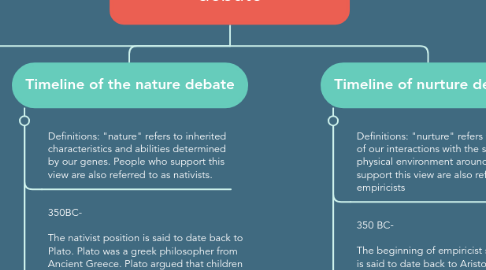
1. Timeline of interactionist debate
1.1. Definitions: "Interactionist" refers to the idea that both nature and nurture shapes who we are.
1.2. 2007- Epigenetics is a scientific theory that shows that environmental factors can actually change your genes. This breaks apart the idea that everything is either based on Nature or Nurture. Epigenetics means that there are a combination of factors that can shape a person. For example if someone has a genetic predisposition towards alcoholism then if they choose not to drink then their genes which help create alcoholism will not be utilised.
2. Timeline of the nature debate
2.1. Definitions: "nature" refers to inherited characteristics and abilities determined by our genes. People who support this view are also referred to as nativists.
2.2. 350BC- The nativist position is said to date back to Plato. Plato was a greek philosopher from Ancient Greece. Plato argued that children did not learn anything new, but access knowledge that had previously laid dormant in the child's brain. This theory proposed that the children's knowledge was passed down through their parents and while Plato would not have understood genetics this has parallels to later theories on the nature side of the debate.
2.3. 1600s- John Locke was an English philosopher and physician. He supported Aristotle's views that humans are not inherently born with knowledge but develop knowledge through experience he developed the theory of 'Tabula Rasa' meaning a blank slate. This theory states that children are born with a blank slate and can be shaped by their environment around them.
2.4. 1859- Charles darwin theory of evolution. Charles Darwin proposed the theory of "Survival of the fittest" This theory states that those who have strong genetics will survive to reproduce and will therefore pass on their genetics to their offspring.
2.5. 1930s to 1940s- Hitler thought he could use the idea of eugenics and selective breeding to create a 'better race' during the holocaust and world war 2
2.6. 1950s- John Bowlby was a British psychoanalyst born in 1907. His attachment theory suggested that children come into the world biologically programmed to form attachments, because this will help them to survive.
2.7. 1960s- Noam Chomsky Language aquisition. Chomsky's theory of language acquisition states that humans are born with an innate ability to acquire language
2.7.1. Aphasia is a disorder that occurs after trauma to the left hemisphere of the brain. Depending on the area of damage there are different types of aphasia that creates different problems. Wernicke’s aphasia causes patients to no longer understand language. While they can still form sentences none of the words spoken to them, nor what the words they are saying mean. Broca's aphasia has the opposite effect. They have trouble forming language but understand what is being said to them
2.8. 1980s- Twin studies have proven very important to the nature vs nurture debate. Twin studies, more importantly studies on identical twins separated at birth or very young ages allow us to study the similarities and differences between how the individual twins have developed. One case that shows this was the study of the 'Jim twins' from the 1980s
2.9. 2003- In April of 2003, a study called the human genome project occured. This was lead by a team of scientists from all over the world who looked to map out all of the genes inside a human. This study gave us the ability to see the complete genetic blueprint for a human being. The human genome project discovered that there are approximately 20,500 different genes in a human all with different roles. This showed that many things could be due to nature and a certain gene and not nurture as previously speculated.
3. Timeline of nurture debate
3.1. Definitions: "nurture" refers to the influence of our interactions with the social and physical environment around us. People who support this view are also referred to as empiricists
3.2. 350 BC- The beginning of empiricist side of the debate is said to date back to Aristotle. Aristotle was a Greek philosopher from Ancient Greece. Aristotle theorised that babies were not born with knowledge, instead they learn it through their experience. His thoughts were first published in De Anima which is a book he published in 350BC, that translates to 'On The Soul'
3.3. 1600s- Descartes was a French philosopher in the 17th century. He believed that everything relied on you and reasoning skills. Descartes famously quoted "I think therefore I am."
3.4. 1910 to 1930s- John Watson was an American Psychologist born in 1878. he was the founder of the behaviorist approach of psychology. He stated that babies could be shaped from birth, and that your personality was based on your environment.
3.4.1. A famous quote from Watson is: "Give me a dozen healthy infants, well formed and my own specified world to bring them up in and I'll guarantee to take any one at random and train him to become any type of specialist i might select - doctor, lawyer, artist, merchant-chief, and yes, even beggar man and thief, regardless of his talents, penchants, tendencies, abilities, vocations, and race of his ancestors"
